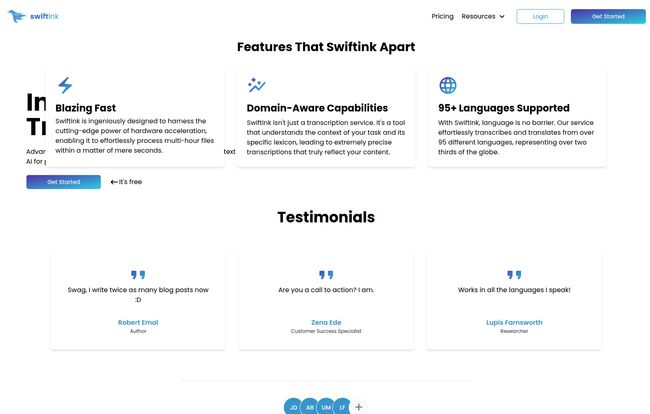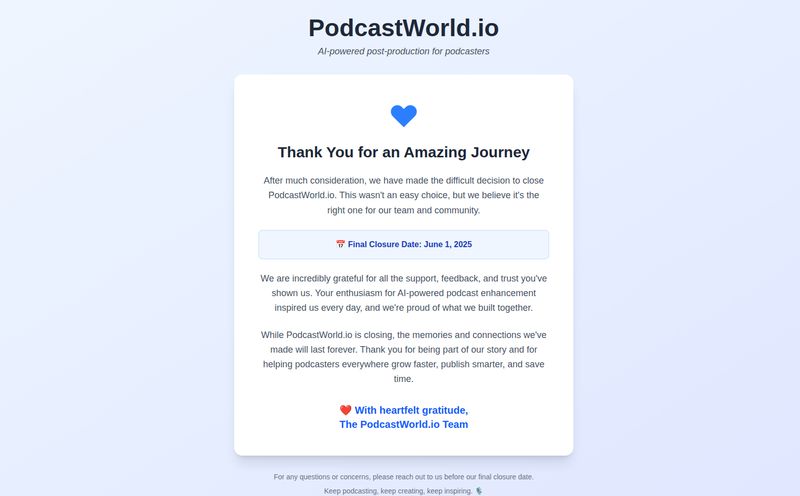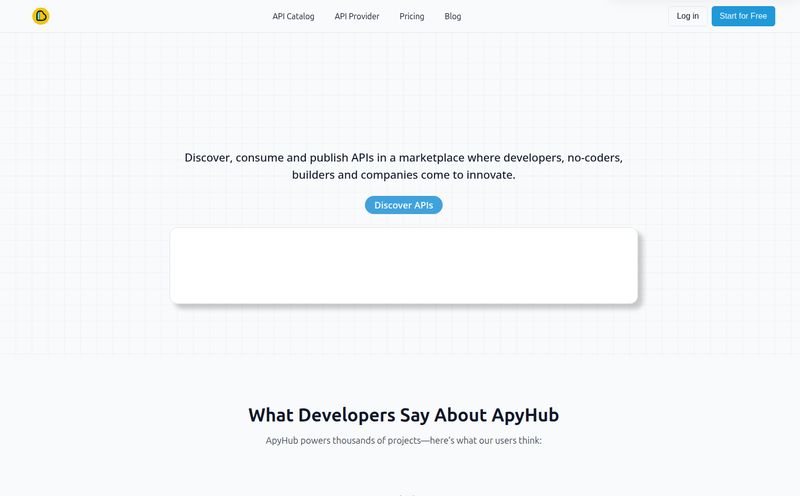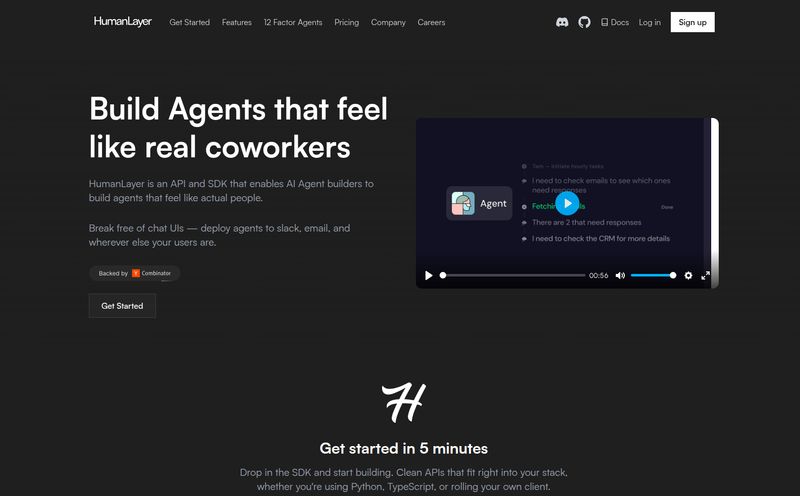If you've ever had to transcribe audio, you know the special kind of pain it brings. That soul-crushing moment you realize your one-hour podcast interview will take at least four hours to type out manually? Yeah, we've all been there. Staring at a blinking cursor, rewinding the same 10 seconds over and over... what did they just say?! It’s a traffic generation strategy I wouldn't wish on my worst competitor.
For years, we've been promised a savior in the form of AI transcription. And while some tools have come close, they often stumble. They're slow, they butcher names, and they have a complete meltdown with any kind of technical jargon. So when I stumbled across a platform called Swiftink, I was skeptical but, as always, hopeful. It makes some big claims: blazing speed, crazy accuracy, and something they call “Domain-Aware Capabilities.”
So, I did what any good SEO and content nerd would do. I put it through its paces. Is it just another tool in a sea of mediocre options, or is it actually something special? Let's get into it.
What Exactly Is This Swiftink Thing Anyway?
At its core, Swiftink is an AI platform designed to do one thing really well: turn your audio and video files into text. Simple enough. But the 'how' is what gets interesting. It's built on the back of OpenAI’s Whisper model, which, if you've been following the AI space, you know is pretty much the top-tier engine for this kind of work right now. This isn't some homegrown model built in a garage; it’s leveraging one of the most powerful speech recognition systems on the planet.
But Swiftink isn’t just a pretty face for Whisper. They’ve added their own secret sauce on top, focusing on speed and, most importantly, context.
The Features That Actually Matter
A feature list is just a list until you see how it applies to your actual workflow. Here’s what stood out to me from their homepage and my own testing.
It's Ridiculously Fast. No, Really.
They call it “Blazing Fast,” and I have to admit, they’re not exaggerating. The site claims it can process multi-hour files in a matter of mere seconds thanks to some cutting-edge hardware acceleration. While 'seconds' might be a bit of marketing flair for a two-hour file, it chewed through a 45-minute podcast episode of mine in under 5 minutes. Compared to some other services where you upload a file and go make a cup of coffee (or lunch), this is a game-changer. It feels less like submitting a job and more like a real-time conversion.
‘Domain-Aware’ Isn't Just Marketing Jargon
This is the one. This is the feature that made me lean in. Most transcription tools are generalists. They know common words, but throw a conversation about ‘CPC optimization strategies’ or ‘mitochondrial ATP synthesis’ at them, and they just fall apart.
Swiftink’s Domain-Aware AI is designed to understand the specific lexicon of your field. Think of it like a translator who not only speaks the language but also understands the slang, the in-jokes, and the technical terminology of a specific industry. The website specifically calls out Medical Practitioners, Business Professionals, and Academics as use cases, and it's easy to see why. Getting a transcript back that correctly spells medical terms or identifies marketing acronyms without me having to fix every other sentence is, frankly, a massive relief.
Speaking Your Language (Literally, 95+ of Them)
As someone who works with international clients, the language support is a huge plus. Swiftink handles over 95 languages. This isn't just for transcribing a French or Spanish video; it's also for handling interviews with speakers who have different accents. The AI seems much more robust at parsing various accents within the same language, which results in a cleaner initial draft. One of the testimonials on their site simply says, "Works in all the languages I speak!" and I can see the appeal for multilingual creators and researchers.

Visit Swiftink
Let's Talk Money: The Swiftink Pricing Plan
Alright, so it's fast and smart. But what’s it going to cost me? This is often where these amazing tools lose me, with complicated credit systems or enterprise-level pricing. I was pleasantly surprised by Swiftink's approach.
Their pricing page is refreshingly simple. There are two main tiers: Free and Pro.
The Swiftink Free plan is genuinely free. You get 2 hours of transcription per month, which is incredibly generous. It’s more than enough to test it out thorougly, transcribe a few podcast episodes, or handle the occasional meeting notes. You can upload files or just paste in a URL, and it includes accurate timestamps. Best of all? No credit card required to sign up. I love that. It shows confidence in their product.
Then there's the Swiftink Pro plan. It comes in at $15 per month. For that, you get unlimited access, unlimited AI completions (which I take to mean transcriptions), and priority support. If you’re a heavy user—a podcaster, a video creator, a journalist—this is a no-brainer. Fifteen bucks a month to save what could easily be dozens of hours of manual labor? That’s an ROI you don't even need a spreadsheet for. They also offer a 15% discount if you pay annually, which is a nice little bonus.
The pricing feels fair and aimed at real users, from students to full-time professionals, not just massive corporations.
My Real-World Take: The Good, The Bad, and The Quirky
Using the tool is straightforward. The interface is clean, almost minimalist. You upload your file, and it gets to work. There are no unnecessary bells and whistles, which I appreciate.
The accuracy is impressive, especially with the domain-aware context. I fed it a clip where I was discussing SERP volatility and Google algorithm updates, and it handled terms like 'canonicalization' and 'E-A-T' without flinching. That alone saved me a ton of editing time.
Are there any downsides? Well, nothing is perfect. The platform’s strength—its reliance on OpenAI's Whisper—could also be a potential limitation. If Whisper has a bad day or a specific weakness (like with very, very heavy accents or poor audio quality), Swiftink will inherit that. It’s a trade-off for getting access to such a powerful engine without having to pay enterprise-level API fees directly to OpenAI.
Also, while the per-month pricing is clear, I'd be curious to see more detailed documentation on their API pricing for developers looking to integrate this into their own apps. It's a minor point, but something for the power users to consider.
So, Who Is Swiftink Actually For?
I can see a few groups getting a massive benefit from this:
- Content Creators & Podcasters: Turn your episodes into blog posts, show notes, and social media content in minutes. The speed is critical here.
- Researchers & Academics: Transcribing interviews and lectures with technical language becomes so much easier. The domain-aware AI is a lifesaver.
- Business Professionals: Get accurate notes from your Zoom meetings, webinars, and conference calls.
- Medical Practitioners: Dictating notes or transcribing patient consultations with a high degree of accuracy for medical terminology.
- Marketers & SEOs: Quickly pull key quotes and content from video interviews and webinars to fuel your content strategy.
Frequently Asked Questions about Swiftink
- Is Swiftink really free to use?
- Yes! The Swiftink Free plan gives you 2 hours of transcription every month at no cost, and you don't need a credit card to sign up. It’s a great way to see if it fits your needs.
- What makes Swiftink different from other transcription services?
- Two main things: its incredible speed due to hardware acceleration and its 'Domain-Aware' AI, which provides much higher accuracy for technical or niche-specific language.
- How accurate is Swiftink's transcription?
- Because it's powered by OpenAI's Whisper and enhanced with its own AI, the accuracy is very high, especially in good audio conditions. The domain-aware capability significantly reduces errors with jargon and specialized terms.
- Can I use Swiftink for languages other than English?
- Absolutely. Swiftink supports over 95 languages, making it a powerful tool for global content and multilingual teams.
- What does 'domain-aware' transcription even mean?
- It means the AI has been trained to understand the specific vocabulary and context of different fields, like medicine, law, or technology. This leads to more accurate transcripts that require less manual correction.
- Does Swiftink offer an API?
- Yes, the website mentions an API and a plugin, which suggests you can integrate its transcription services into your own applications and workflows.
The Final Word on Swiftink
So, is Swiftink worth the hype? In my opinion, yes. It's one of the most practical and powerful AI transcription tools I’ve used in a while. It’s fast, impressively accurate with complex topics, and the pricing is both fair and transparent.
It takes the grunt work out of transcription and turns it into a simple, quick task. It's a perfect example of AI doing what it does best: automating the tedious stuff so we can focus on the creative, strategic parts of our jobs. If you're still on the fence, the generous free plan makes it a no-risk proposition. Give it a shot; you might just get a few hours of your life back.



